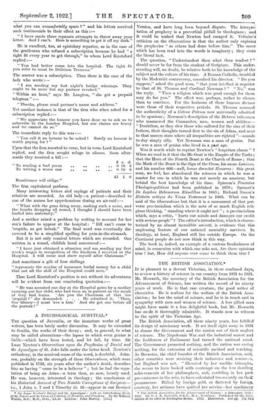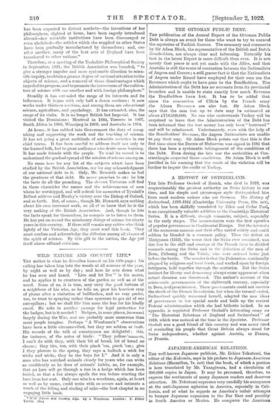THE BRITISH ASSOCIATION.* IT is pleasant to a devout Victorian,
in these confused days, to review a history of science in our country from 1831 to 1921. Mr. Howarth, the secretary of the British Association for the Advancement of Science, has written the record of its ninety years of work. He is that rare creature, the good writer of chronicles. He is zealous for the welfare of the British Asso- ciation ; he has the mind of science, and he is in touch and in sympathy with men and women of science. A less gifted man might have made it a less delightful book, but Mr. Howarth has nude it thoroughly admirable. It stands now as witness to the spirit of the Victorian Age.
The British Association, all these ninety years, has fulfilled its design of missionary work. It set itself right away in 1831 to shame the Government and the nation out of their neglect of science. The Napoleonic War and the industrial unrest and the feebleness of Parliament had turned the national mind. The Government promoted nothing, and the nation was caring nothing, for the extension of scientific method and teaching. As Brewster, the chief founder of the British Association, said, other countries were reviving their industries and resources, but England was not. " Elevated by her warlike triumphs, she seems to have looked with contempt on the less dazzling achievements of her philosophers, and, confiding in her past pre-eminence in the arts, to have calculated too securely on their permanence. Bribed by foreign gold, or flattered by foreign courtesy, her artisans have quitted her service—her machinery • The British Association for the Advancement of Science : a Itetrospect, 1831- 1921. By 0. J. R. Howarth, 0.B.B., M.A., Secretary. Published by the Asso- ciation at ita °Pace in Burlington Rouse. 1922. illustrated. 318 pp. [7s. 8d.I
has been exported to distant markets—the inventions of her philosophers, slighted at home, have been eagerly introduced abroad—her scientific institutions have been discouraged or even abolished—the articles which she supplied to other States have been gradually manufactured by themselves ; and, one after another, many of the best arts of England have been transferred to other nations."
Therefore, at a meeting of the Yorkshire Philosophical Society in September, 1831, the British Association was founded, " to give a stronger impulse and more systematic direction to scien- tific inquiry, to obtain a greater degree of national attention to the objects of science, and a removal of those disadvantages which impeded its progress, and to promote the intercourse of the cultiva- tors of science with one another and with foreign philosophers."
Steadily it has extended the range of its interests and its influences. It began with only half a dozen sections ; it now works under thirteen sections, and among them are educational science, agriculture, and psychology. It has extended, also, the range of its visits. It is no longer British but Imperial. It has visited the Dominions : Montreal in 1884, Toronto in 1897, South Africa in 1905, Winnipeg in 1909, and Australia in 1914.
At home, it has rubbed into Government the duty of recog- nizing and supporting the work and the teaching of science. It has set going a great multitude of scientific societies in our chief towns. It has been careful to address itself not only to the learned folk, but to great audiences who desire more learning. It has made friends with the people. To read its record is to understand the gradual spread of the mission of science among us.
No room here for any list of the subjects which have been studied by the British Association, nor for any acknowledgment of our national debt to it. Only, Mr. Howarth makes us feel the greatness of that debt. He never preaches to us : be lets the facts do all the preaching. The devout Victorian will find in these chronicles the names and the achievements of men whom he worshipped, and will refresh his memories of Tyndall's Belfast address and Huxley's victory over the Bishop of Oxford, and so forth. But, of course, though Mr. Howarth says nothing about his own incessant work, we all of us know that he is the very making of the British Association. And, though he lets the facts speak for themselves, he compels us to listen to them. He has put on record the missionary doings of science for ninety years in this country. If there still remain any critics who think lightly of the Victorian Age, they must read this book. They must confess and acknowledge the diffusion among all classes of the spirit of science. By this gift to the nation, the Age put itself above offhand criticism.



































 Previous page
Previous page